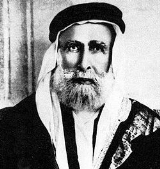
Hussein bin Ali, Sharif of Mecca
Overview
Order of the Bath
The Most Honourable Order of the Bath is a British order of chivalry founded by George I on 18 May 1725. The name derives from the elaborate mediæval ceremony for creating a knight, which involved bathing as one of its elements. The knights so created were known as Knights of the Bath...
(1854 – June 4, 1931) (حسین بن علی; Ḥ
H
H .) is the eighth letter in the basic modern Latin alphabet.-History:The Semitic letter ⟨ח⟩ most likely represented the voiceless pharyngeal fricative . The form of the letter probably stood for a fence or posts....
usayn bin ‘Alī) was the Sharif of Mecca
Sharif of Mecca
The Sharif of Mecca or Hejaz was the title of the former governors of Hejaz and a traditional steward of the holy cities of Mecca and Medina...
, and Emir
Emir
Emir , meaning "commander", "general", or "prince"; also transliterated as Amir, Aamir or Ameer) is a title of high office, used throughout the Muslim world...
of Mecca
Mecca
Mecca is a city in the Hijaz and the capital of Makkah province in Saudi Arabia. The city is located inland from Jeddah in a narrow valley at a height of above sea level...
from 1908 until 1917, when he proclaimed himself King
Kingdom of Hejaz
The Kingdom of Hejaz was a state in the Hejaz region, ruled by the Hashemite family. The kingdom was annexed by Nejd and merged into the Kingdom of Nejd and Hejaz in the mid 1920s, which would eventually be known as Saudi Arabia in 1932.-Kings of Hejaz:...
of Hejaz
Hejaz
al-Hejaz, also Hijaz is a region in the west of present-day Saudi Arabia. Defined primarily by its western border on the Red Sea, it extends from Haql on the Gulf of Aqaba to Jizan. Its main city is Jeddah, but it is probably better known for the Islamic holy cities of Mecca and Medina...
, which received international recognition. He initiated the Arab Revolt
Arab Revolt
The Arab Revolt was initiated by the Sherif Hussein bin Ali with the aim of securing independence from the ruling Ottoman Turks and creating a single unified Arab state spanning from Aleppo in Syria to Aden in Yemen.- Background :...
in 1916 against the increasingly nationalistic Ottoman Empire
Rise of nationalism under the Ottoman Empire
The rise of the Western notion of nationalism under the Ottoman Empire eventually caused the break-down of the Ottoman millet concept...
during the course of the First World War
World War I
World War I , which was predominantly called the World War or the Great War from its occurrence until 1939, and the First World War or World War I thereafter, was a major war centred in Europe that began on 28 July 1914 and lasted until 11 November 1918...
. In 1924, when the Ottoman Caliphate was abolished, he further proclaimed himself
Sharifian Caliphate
The Sharifian Caliphate is the term used to describe the unsuccessful attempts at the beginning of the 20th century to establish an Arab caliphate headed by the Sharifs of Mecca in replacement of the Ottoman Caliphate. The idea had been floating around since at least the 15th century...
Caliph
Caliph
The Caliph is the head of state in a Caliphate, and the title for the ruler of the Islamic Ummah, an Islamic community ruled by the Shari'ah. It is a transcribed version of the Arabic word which means "successor" or "representative"...
of all Muslims. He ruled Hejaz until 1924, when, defeated by Abdul Aziz al Saud
Ibn Saud of Saudi Arabia
King Abdul-Aziz of Saudi Arabia was the first monarch of the Third Saudi State known as Saudi Arabia. He was commonly referred to as Ibn Saud....
, he abdicated the kingdom and other secular titles to his eldest son Ali.
The eldest son of Sharif Ali ibn Muhammad by his wife, Salha Bani-Shahar, Hussein bin Ali was born in 1853 in Istanbul and was the last of the Hashemite
Hashemite
Hashemite is the Latinate version of the , transliteration: Hāšimī, and traditionally refers to those belonging to the Banu Hashim, or "clan of Hashim", a clan within the larger Quraish tribe...
rulers over the Hejaz to be appointed by the Ottoman Sultan
Ottoman Empire
The Ottoman EmpireIt was usually referred to as the "Ottoman Empire", the "Turkish Empire", the "Ottoman Caliphate" or more commonly "Turkey" by its contemporaries...
.

